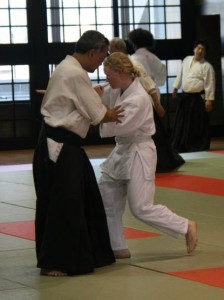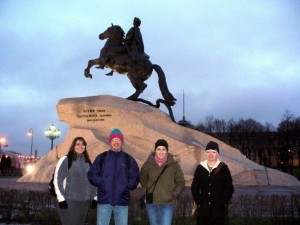I grew up in a small town on the Oregon coast, where most people don’t ever travel far from home. I was home-schooled until high school through a private academy correspondence curriculum. I believe this experience gave me a very unique education and perspective on learning. When I attended public high school, I realized that students there all had different ways of solving problems and accomplishing assignments than I did. Figuring out how to share ideas and collaborate from our different perspectives was not unlike cross-cultural communication.
This adaptability came in handy in another situation: I had the opportunity to travel through Ireland with a friend for a couple weeks during my sophomore year. Far from being overwhelmed by the experience of traveling abroad for the first time, I felt I was very much in my element. I couldn’t wait to go abroad again. This feeling helped me decide to attend Linfield College in McMinnville, Oregon, which is well-known for its study abroad programs.
 At Linfield, I majored in history and minored in German and Theatre Arts. To improve my German, I studied abroad for a semester in Vienna, Austria. I lived with a host mother and attended classes at the Amerika-Institut, located across the street from the Opera, and studied advanced German at the University of Vienna. That amazing semester inspired me to write my capstone thesis on the expression of national identity through architecture at the turn of the century in Austria-Hungary. Vienna remains one of my favorite places around the world.
At Linfield, I majored in history and minored in German and Theatre Arts. To improve my German, I studied abroad for a semester in Vienna, Austria. I lived with a host mother and attended classes at the Amerika-Institut, located across the street from the Opera, and studied advanced German at the University of Vienna. That amazing semester inspired me to write my capstone thesis on the expression of national identity through architecture at the turn of the century in Austria-Hungary. Vienna remains one of my favorite places around the world.
For every student who goes abroad, Linfield pays for the airfare for their first trip, but will also pay if the student is studying abroad to fulfill a language major or minor. Because of that, I was able to also participate in a second study abroad experience: a January Term, instructor-led political science/history course in Russia and the Baltic.
The experience of traveling through multiple countries where I didn’t speak the language, or know much about the culture before going, made me appreciate my ability to quickly adapt to new situations even more. Because of that ability, as graduation approached and I felt I wasn’t quite ready to hang up my travel hat, I didn’t think twice about applying to the JET Programme to teach English in Japan, even though I didn’t speak a word of Japanese.
I was accepted into JET and placed in Akabira, a small town on the northern island of Hokkaido. I was the only foreign English teacher and quickly discovered neither my supervisor nor anyone in the Board of Education spoke English. While this presented many challenges, I never felt discouraged; it was actually quite the opposite. I ended up staying for the maximum time allowed on JET, five years, being the first Assistant Language Teacher (ALT) in Akabira to do so. I rotated between the town’s two junior high schools and five elementary schools. I developed the elementary school English program virtually from scratch when it became mandatory in my third year. Ensuring the success of that program was one of the main reasons I ended up staying a fourth and then fifth year.
 Through my work in Japanese schools participating in many activities, including aikido, flower arranging, and pottery, my understanding of Japanese culture and language developed rapidly. But more than understanding Japan specifically, I had developed many skills through participating in cross-cultural communication both as a student and as a facilitator.
Through my work in Japanese schools participating in many activities, including aikido, flower arranging, and pottery, my understanding of Japanese culture and language developed rapidly. But more than understanding Japan specifically, I had developed many skills through participating in cross-cultural communication both as a student and as a facilitator.
After finishing my time on JET, I realized I wanted to use these skills to help others bridge the gap between themselves and communities abroad. I feel very fortunate to have had so many opportunities to go abroad, and I feel very strongly that this experience needs to be an integral part to education as our world becomes an increasingly global community.





Networks
Plugin created by StressFree Sites